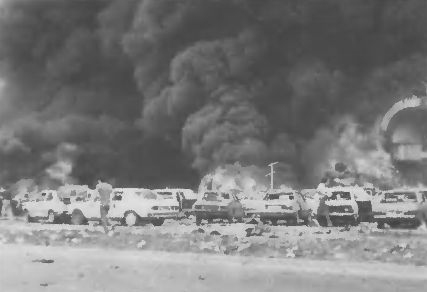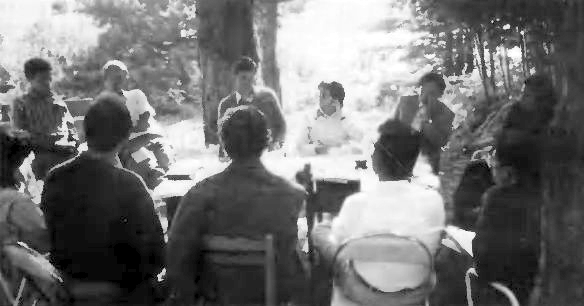![]()
The Words of the Symon Family
|
|
The Words of the Symon Family |

In
1985 a car bomb explodes on the outskirts of Beirut, Lebanon, only a
short distance from the center.
When I graduated from the Unification Theological Seminary at the end of June 1987 and was asked to work in the Middle East, I was almost completely ignorant about the activities of the Unification movement in this region. Although I had journeyed through parts of the Middle East before and considered myself reasonably well educated in terms of world geography, I found to my embarrassment that there were countries in this area I had never heard of before. This last year has been a process of education, brought sharply into focus for me during the 1988 Middle East regional conference and workshop held on a mountain in Turkey this July.
Open any newspaper and you will immediately realize that the Middle East is one of the most conflict-ridden areas of the globe. Things that seem almost unbelievable in America or other comparatively peaceful countries of the West are everyday realities in the Middle East. There are very few parts of this region untouched by violence. Think about Israel, Lebanon, or the Persian Gulf. Even here in Greece, the regional headquarters, acts of terrorism are becoming more frequent. It wasn't until I heard the testimonies of our Middle Eastern brothers and sisters at the conference, however, that I began to even vaguely comprehend what it means to function in the middle of a war zone.
One sister from Lebanon described how she and her family had been sitting together in their house when a rocket came through the wall and blew her brother to bits right in front of their eyes. She said the front line of the fighting moves around Beirut -- sometimes near to our center, sometimes not so near. The sound of rockets and gunfire is the background to their life, the occasional car bomb just another hazard to deal with. And in the middle of this, our family continues to make witnessing contacts and calmly fundraise door to door.

National
and business leaders meet during the Middle East regional conference.
Members described their situation living in Tehran, the capital of Iran, where Iraqi bombs fall randomly on the city almost daily. All Iranian men must do military service. If they don't, they can't get ID cards or passports and are forced to become fugitives. If caught, they get sent to the front line in active combat. But even in this situation God works. One of our brothers was witnessed to and joined while on active combat duty.
As the workshop progressed, I realized that war is not the only thing our brothers and sisters have to deal with. Isolation and persecution, in many cases, have a more profound effect. The situation of our members in Iran provides a most graphic illustration. At the time of the revolution in 1979 that brought the Ayatollah Khomeini to power, the original missionaries had to leave the country. The members who remained had a big responsibility but little experience. Because the authorities considered the movement a threat, it became increasingly difficult for them to witness, fund- raise, or do home church. The only open avenue was education. But meeting with each other was difficult and the members had to be very careful.
Eventually the center was raided, all books and other Unification material were confiscated, and several members were jailed. After that, they were forced to become even more covert, witnessing only to those members of their physical families who could be trusted. Under these circumstances, amazingly, membership steadily grew.
Recently, the national leader of Iran was thrown in jail and tortured until unable to walk. The movement was attacked in the press, and the members were forced to cease all activities completely.
The members there now are incredibly young. There are no blessed couples to give them education or guidance. There are no centers. It is not even safe for them to receive overseas mail. They meet at the risk of their lives. If they were discovered, it would certainly mean death and torture. They receive very little news about the current providence or the activities of the rest of the movement. They naturally feel cut off, isolated, and alone. It is all they can do to keep their faith. For some of them, this workshop was the first time they were even able to meet other Iranian members and the first time they could study the Principle openly.
In other countries, only one couple or a single member exists. Many of them have been alone since 1975 when Father sent the first missionaries out. Many experienced being thrown in jail or deported in earlier years for openly witnessing, which forced them to move from country to country. With faith and determination, they have had to learn to survive and be creative in finding ways to support themselves financially and to introduce True Parents to the region. There have been many times of desperation.
At this workshop it seemed as if two generations were represented -- the somewhat battle-scarred survivors, and the struggling young. We heard testimonies I from the older generation every morning and evening. I was moved to watch them respond to the needs of the young, reaching out with tenderness and heart, sharing their love, wisdom, and experience, and being revitalized in turn by the youthful faith and enthusiasm of the others. As a regional family, we grew substantially closer as a result of this workshop.
Up until this point, the basis of my religious education had been Christian. It was most interesting to hear the Principle presented from an Islamic point of view. I was surprised to discover how closely the Koran is related to the Principle.
Meeting with people from this area and visiting historic places like nearby Nicaea and Istanbul brought these lectures and our discussions of the history of restoration to life.
This workshop, an arm- al activity of the region, was also the venue for the first Middle East national leader's conference. Each leader gave a comprehensive report about the activities in his or her country, focusing on business (the major emphasis of this meeting). National and regional issues were discussed, and solutions were worked out collectively, stressing in particular intraregional cooperation. A major concern was finding practical ways of helping the Iranian members develop an economic base for their activities in the future. It was a most constructive encounter.
More than anything, this workshop helped put my own life in perspective. I realize now that my problems are nothing compared to the life-and-death situations some of our members in this region face. All too often I have been defeated by things that in retrospect seem so petty. Thinking of these members, how can I complain? How much more should I be doing in my situation? As our regional director Thomas Cromwell reminded us at the close of our conference, this is True Parents' course; this is the ultimate standard -- in every moment to lay down one's life in the service of God.